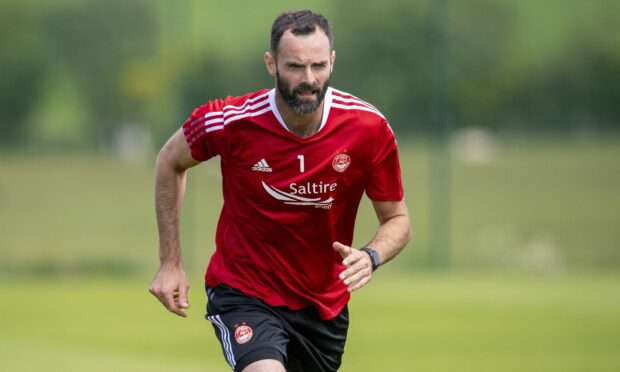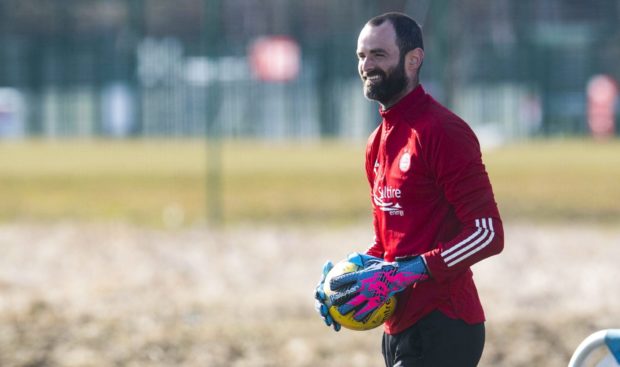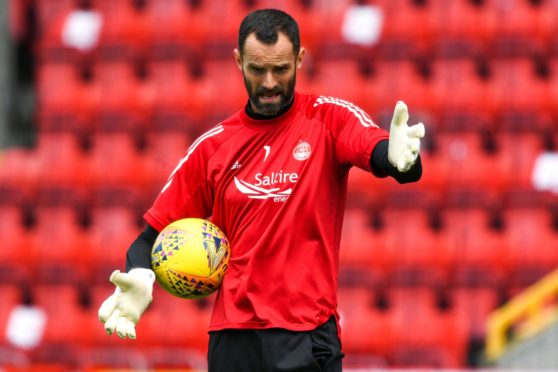Joe Lewis may have three years left on his contract but the Aberdeen captain is already preparing for life after football.
The 33-year-old is midway through studying for an HNC in business at North East Scotland College and making the most of the college’s distance learning option to ensure he can combine coursework with commitments in football and at home.
Pittodrie has been home to a number of players who have pursued career ambitions outside of the game in recent years.
Shay Logan set up his own plumbing and heating company after embarking on his apprenticeship whilst still with the club and former Dons defender Mark Reynolds, now with Dundee United, completed a degree in mechanical engineering in 2019.
Russell Anderson, another former Aberdeen captain, gained a diploma in financial planning during his playing days which paved the way to a career in the financial services industry and Tomas Cerny retired due to injury last summer to focus on retraining as a PE teacher.
Lewis said: “It was actually Mark Reynolds who inspired me to go to college.
“I’m fortunate I’ve had those experiences of seeing other people do it the right way and the wrong way and I’m using that to help myself.
“You have to plan for the future, I’ve witnessed people early my career who didn’t do that – you get an injury or your career fizzles out a bit quicker than you think it’s going to and then all of a sudden you’re in a sticky situation.
“If you’re not ready to go into another job or you’re not preparing for that next step it can be really difficult.”
For Lewis it marks a return to education for the first time since leaving school and signing as a professional with Norwich City in 2003 and he admits it was a prospect that brought some trepidation.
He said: “It was the first time I’d written more than a paragraph in 15 or 16 years, it was quite scary. Even when I was 14 or 15 I knew I was going into football and I signed my first professional contract at 17.
“I wish I’d kept my education going at that age but at the time you don’t think about it, you think you’re going to be a footballer forever.
“Then once you get into your 30s you realise that isn’t the case and you’ve got to have something after football.
“Distance learning can be a bit daunting at the start because you are second guessing yourself, but the tutor was really helpful and available all the time.
“It has been great – I’m just over halfway through, so I’ve got a little way to go, but I’m enjoying it.”
The football journey has taken Lewis from Norwich to Peterborough and from Cardiff to Aberdeen. Where the career path leads after the roar of the crowd has faded is something he is keeping an open mind about.
The former England under-21 international said: “I’d like to stay within football but on the business side.
“I’m not 100% certain on that, that’s where I think the HNC in Business is great foundation.
“When I complete this I will have to make my mind up a more about what direction I want to go in, there’s the potential to go on and do the HND or maybe using the HNC as a gateway to doing something more specific, football related or something else depending what I want to do.”
What he is in no doubt about is the fact the experience gained and skills developed as a sportsman will transfer into his chosen profession, with the benefits of that already shining through during his college studies.
Lewis said: “With football, not just as a player but everyone in the industry and the sports industry as a whole I would say, your work it becomes your life and you’re expected to be 100% committed to it by everyone – by supporters, by your manager, team-mates.
“You get used to that and if you do something you do it properly and commit fully. Hopefully that will help when you go into other jobs, you show that commitment.
“The college studies are slightly different to the day job – you haven’t got someone shouting at you from the side, telling you what to do and when to do it, so that requires a bit more discipline.
“You’ve got to find your own motivation and that’s where the most difficult part is, getting into that routine of studying and not falling out of it.
“If you have a couple of weeks off for whatever reason, it’s like if you don’t go to the gym for a while those first few sessions are always difficult. It’s similar with studying, you have to get into the routine of doing it and it becomes a lot easier doing it that way.
“I’ve always thought that after a training session or a gym session you come out feeling much better.
“It’s the same with a mental activity, after doing a couple hours of study when you finish that it’s quite satisfying coming away from that feeling like you’ve achieved a bit and you can then put Netflix on with a bit more knowledge that you’ve earned your downtime.”


